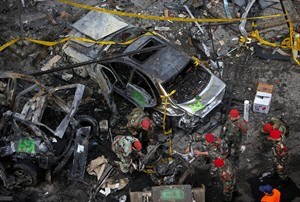
Lebanese Army investigators inspect the site of a car bomb explosion, in a Shiite area and stronghold of the Lebanese militant group Hezbollah, in the southern suburb of Beirut, Lebanon, Friday, Jan. 3, 2014. An explosion tore through a crowded commercial street Thursday in a south Beirut neighborhood that is bastion of support for the Shiite group Hezbollah, killing several people, setting cars ablaze and sending a column of black smoke above the Beirut skyline. (AP Photo/Hussein Malla)
January 03, 2014 - 7:52 AM
BEIRUT - DNA tests confirmed that a man in Lebanese custody is the suspected leader of an al-Qaida-linked group that has claimed responsibility for bombings across the Middle East, the Lebanese army said Friday.
In a brief statement, the military said the tests established the detainee's identity as Majid al-Majid, a Saudi citizen and the commander of the Abdullah Azzam Brigades. Al-Majid is on Saudi Arabia's list of 85 most-wanted individuals, and the U.S. State Department has designated the group he leads a foreign terrorist organization.
The group has claimed responsibility for attacks throughout the region, including the 2010 bombing of a Japanese oil tanker in the Persian Gulf and several rocket attacks from Lebanon into Israel. The latest attack claimed by the group was the Nov. 19 double bombing of the Iranian Embassy in Beirut that killed at least 23 people and wounded dozens.
In 2012, the U.S. declared the Abdullah Azzam Brigades a terrorist group. The State Department's action froze any assets it holds in the U.S and banned Americans from doing business with the group.
The Lebanese authorities have not disclosed when or where al-Majid was arrested.
Al-Majid took over the group in mid-2012 after the organization's previous leader, Saleh al-Qarawi, was gravely wounded in Pakistan, said Mustafa Alani, the director of the security department at the Geneva-based Gulf Research Center.
Al-Majid, who is believed to have serious kidney problems that require dialysis, was an important figure, and the group grew from a relatively small outfit to a larger player under his leadership, Alani said.
"It's become much bigger. Majid al-Majid was able to recruit a lot of Iraqis, Syrians, Lebanese," Alani said. "He's more active, and far more clever than Qarawi."
Al-Majid, who lived for a period of time in the Ein el-Hilweh Palestinian refugee camp outside the Lebanese port city of Sidon, shifted the group's attention after he took control from its earlier anti-Western and anti-Saudi line and focused instead on the civil war in Syria and the fight to oust President Bashar Assad, Alani said.
In the spring of 2013, after the Lebanese Shiite Hezbollah group announced that it was fighting alongside Assad's troops against the Syrian rebels, the Abdullah Azzam Brigades began to target Hezbollah as well — and by extension, their Iranian patrons.
"Since Hezbollah's involvement in Syria, they started to focus their attention on Hezbollah," Alani said. "Before that, they had no problem with Hezbollah."
In its claim of responsibility for the deadly Iranian Embassy bombing in Beirut, the Abdullah Azzam Brigades threatened more attacks against Hezbollah unless the group withdrew its fighters from Syria.
In Tehran, Iranian Foreign Minister Mohammad Javad Zarif said the Islamic Republic is planning to send a team to Lebanon to assist in the process of questioning al-Majid. The official IRNA news agency said Zarif made the remarks during a telephone conversation with his Lebanese counterpart on Friday.
Earlier in the day, families of those killed in the Iranian Embassy bombing demanded that al-Majid, who has not been charged in the attack, be tried in Lebanon and not be sent to his homeland.
Zeinab al-Husseini, whose husband Bilal Kaddaha was killed in the attack, said putting al-Majid on trial in Lebanon would give peace to the families and could act as a deterrent against future violence.
"My husband will not return and I want this man to be executed so that my husband can rest in his grave," said al-Husseini, who had a photo of her late husband pinned to her shirt. "Putting him on trial will be a lesson to others who might think of carrying out terrorist attacks here."
___
Associated Press writers Ali Akbar Dareini in Tehran, Iran, contributed to this report.
News from © The Associated Press, 2014